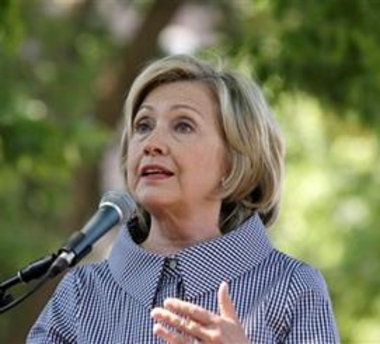Legal experts see no criminal trouble for Clinton thus far

Washington (AP) — Experts in government secrecy law see almost no possibility of criminal action against Hillary Clinton or her top aides in connection with now-classified information sent over unsecure email while she was secretary of state, based on the public evidence thus far.
Some Republicans, including leading GOP presidential candidate Donald Trump, have called Clinton's actions criminal and compared her situation to that of David Petraeus, the former CIA director who was prosecuted after giving top secret information to his paramour. Others have cited the case of another past CIA chief, John Deutch, who took highly classified material home.
But in both of those cases, no one disputed that the information was highly classified and in many cases top secret. Petraeus pleaded guilty to a misdemeanor; Deutch was pardoned by President Bill Clinton.
By contrast, there is no evidence of emails stored in Hillary Clinton's private server bearing classified markings. State Department officials say they don't believe that emails she sent or received included material classified at the time. And even if other government officials dispute that assertion, it is extremely difficult to prove anyone knowingly mishandled secrets.
"How can you be on notice if there are no markings?" said Leslie McAdoo, a lawyer who frequently handles security-clearance cases.
Clinton's critics have focused on the unusual, home-brew email server Clinton used while in office and suggested that she should have known that secrets were improperly coursing through an unsecure system, leaving them easily hackable for foreign intelligence agencies. But to prove a crime, the government would have to demonstrate that Clinton or aides knew they were mishandling the information — not that she should have known.
A case would be possible if material emerges that is so sensitive Clinton must have known it was highly classified, whether marked or not, McAdoo said. But no such email has surfaced. And among the thousands of documents made public, nothing appears near the magnitude of the Top Secret material Petraeus and Deutch mishandled.
Trump, last week, argued differently, saying Petraeus' case involved "far less important documents." Clinton's documents, he told Fox News, "were more highly secret, they were more important, there were more of them. It's really General Petraeus on steroids."
Petraeus, a married former four-star general who headed the CIA from 2011-2012, admitted he gave his biographer and lover, Paula Broadwell, journals containing Top Secret information. These included "the identifies of covert officers, war strategy, intelligence capabilities and mechanisms, diplomatic discussions, quotes and deliberative discussions from high-level National Security Council meetings . and discussions with the president of the United States," according to court documents.
Petraeus also admitted lying to the FBI, while his emails showed he knew the journals contained highly classified information.
He pleaded guilty to one count of unauthorized removal and retention of classified material, a misdemeanor. Though eligible for up to one year in prison, he was sentenced to two years' probation and a $100,000 fine. Broadwell didn't publish the material.
Deutch ran the agency from 1995-1996. He took Top Secret information home and stored it on computers connected to the Internet, something he also did when he worked at the Pentagon. In January 2001, he agreed to plead guilty to a misdemeanor charge of mishandling government secrets, but Bill Clinton pardoned him before the Justice Department could file the case.
Another Clinton administration official, Samuel "Sandy" Berger, pleaded guilty to a misdemeanor in 2005 after admitting to removing five classified documents involving a terrorism study from a National Archives facility. Berger served four years as Clinton's national security adviser.
Hillary Clinton, the Democratic presidential front-runner, now says her use of home email server for government business was a mistake. Last year she provided about 30,000 emails to the State Department, which is public releasing another batch Monday. The department is only publishing documents after scrubbing them of any classified or sensitive information.
Two government inspectors have told Congress they found material in the emails was secret at the time it was sent to Clinton and "never should have been transmitted via an unclassified personal system."
The State Department and the Clinton campaign dispute that the material was classified at the time.
At least one email involved the CIA drone strikes, government officials have told the Associated Press. The counterterrorism program is a poorly kept secret, but a secret nonetheless. Another email appeared to reference a highly classified matter, the officials said, though there was some question about whether the information came in through classified or open channels.
Emails posted on the State Department's web site, made public under the Freedom of Information Act, show diplomats commonly slipping and discussing classified information over email. Unlike an intelligence agency, the department seeks to operate in the open when it can.
But arguing that violations are common isn't a valid defense for ordinary government employees, said Bradley Moss, a lawyer who often represents such people. They face discipline "all the time, in far more nuanced disputes than this," he said.
Although political controversy has centered on Clinton's use of private email instead of an unsecured government account, the distinction matters little in the context of classified information. Clinton says State Department rules allowed her to use private email and officials knew about it.
But another law could be relevant. Under the Federal Records Act, destroying official records can be a crime. Clinton ordered around 32,000 emails deleted from her server because she said they were personal. The server was then wiped, making the emails unretrievable.
"If one person has a copy of one of those deleted emails, and it was about government business, the whole game changes," said Kel McClanahan, a lawyer and expert in government records.
By Ken Dilanian, AP Intelligence Writer. Copyright 2015 The Associated Press. All rights reserved. This material may not be published, broadcast, rewritten or redistributed.
The Gayly – August 31, 2015 @ 5:10pm.





